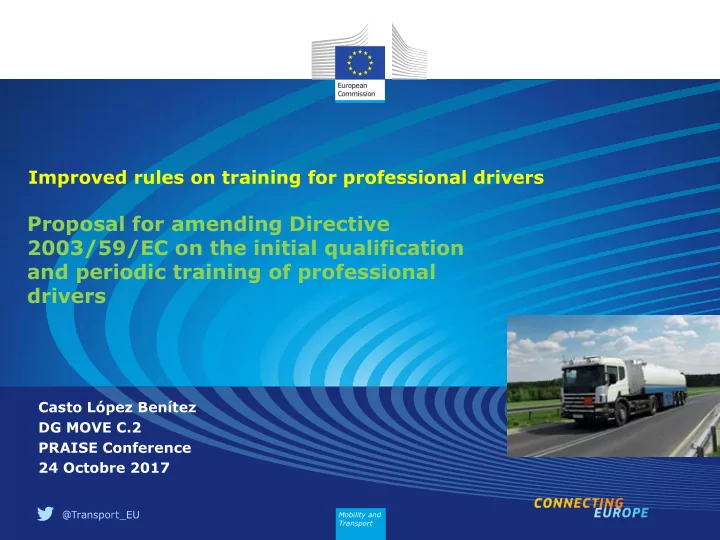

Improved rules on training for professional drivers Proposal for amending Directive 2003/59/EC on the initial qualification and periodic training of professional drivers Casto López Benítez DG MOVE C.2 PRAISE Conference 24 Octobre 2017 Mobility and Transport
EU legislative framework for licensing and training of drivers • Treaty, Article 91 ( which refers to safety ) • Driving Licence Directive • All drivers; linked to international commitments (Vienna Convention) • Professional Drivers Training • Specific training required under other legislation • Dangerous goods, animal welfare …. Transport
Certificate of Professional Competence (CPC) Revision Initiative Main shortcomings of the current Directive • Training content only partially relevant for drivers' needs • Difficulties linked to the mutual recognition of training completed in another MS • Difficulties and Legal uncertainties in the interpretation of the exemptions • Inconsistencies with other EU legislation Transport
CPC Revision Initiative 'Minimum intervention' approach • Target the problems detected in the current legislative framework • Form: amendment of Directive 2003/59/EC, but also relevant provisions of Directive 2006/126/EC on driving licences • No significant impacts on national budgets and administration beyond the regulatory costs are expected Transport
CPC Revision Initiative 'Minimum intervention' approach General policy objectives of the initiative: • Contributing to road safety • Facilitating free movement of professional drivers Specific objectives: • Ensuring that the training content better targets recent technological developments, road safety and fuel efficiency • Ensuring smooth administrative practices for mutual recognition • Improving legal clarity of the Directive and coherence with other EU legislation Transport
CPC Revision Initiative State of play • Adopted by the Commission on 1 February 2017 • Council compromise adopted in June • European Parliament report approved by TRAN committee on 12 October Transport
CPC Revision Initiative PROPOSED AMENDMENTS Exemptions • Clarification ex existing exemption + adding an 'agricultural exemption' Periodic training • ensures that the periodic training includes at least one subject on road safety and that the same subjects are not repeated within the same training • provides that the training is relevant for the work carried out by the specific driver and that it is up to date and relevant Mutual recognition of training • all holders of a CPC are issued either code 95 in their driving licence or driver qualification card Transport
CPC Revision Initiative PROPOSED AMENDMENTS Minimum qualifications and training requirements • better reflect current state of technology; focus on fuel efficient driving • reinforce safe driving • reference to automatic transmission systems • include dangerous goods, animal transport and disability awareness • allow use of ICT tools in training; allow to combine CPC training with other forms of training required under EU legislation Driving Licence Directive Clarify lower minimum age requirements for professional drivers (as an exemption from the general rules in Driving Licence Directive) Transport
CPC Revision Initiative MINUMUM AGE REQUIREMENTS CPC Directive Driving Category Licence Valid across EU Valid in MS (if lower) Directive Ordinary initial Accelerated initial Ordinary initial Accelerated initial qualification Art 6.1 qualification Art. 6.2 qualification Art 6.1 qualification Art. 6.2 C1 18 18 18 C1E Goods C 21 18 21 CE D1 21 21 21 18 Passengers D1E D 23 20 24 21 21 Regular service less 18 without passengers than 50 km DE Transport
Some proposals by Council or EP For the CPC Directive • Electronic exchange of CPC data • Validate other mandatory training for drivers as more than one day of CPC training • Allow training to be split into half-days • Exempt ambulances For the Driving Licence Directive • Exemption for clean vehicles up to 4,2 tons Possibility to use B licence Transport
Conclusion: the CPC Directive can play a role in addressing future mobility challenges in the context of action on work-related road safety Social aspect • Drivers working conditions and mobility • Complex regulatory framework New technology • De-carbonisation: clean vehicles • Automation and connectivity Other mobility challenges • Population ageing • Increased cycling Transport
Thank you Questions? Transport
Recommend
More recommend